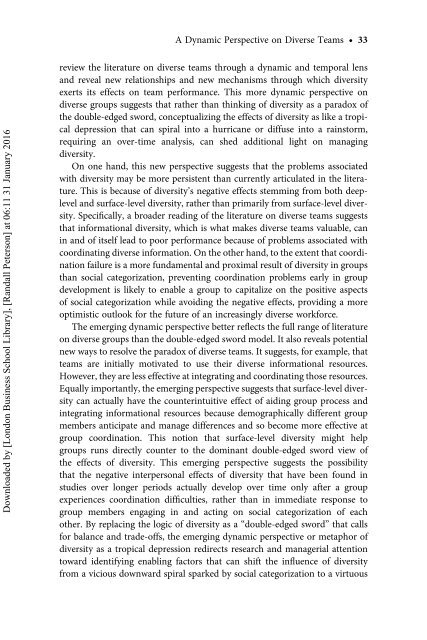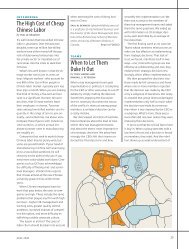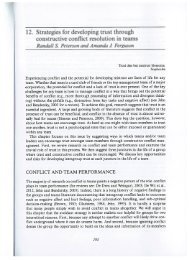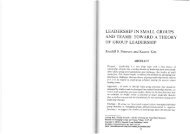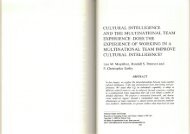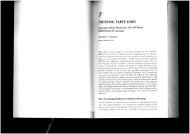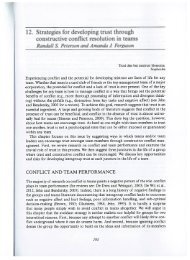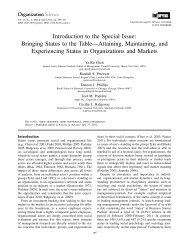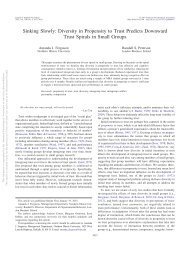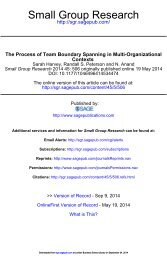A Dynamic Perspective on Diverse Teams: Moving From The Dual Process Model to A Dynamic Coordination-Based Model of Diverse Team Performance - Kannan Srikanth, Sarah Harvey & Randall Peterson
The existing literature on diverse teams suggests that diversity is both helpful to teams in making more information available and encouraging creativity and damaging to teams in reducing cohesion and information sharing. Thus the extant literature suggests that diversity within teams is a double-edged sword that leads to both positive and negative effects simultaneously.
The existing literature on diverse teams suggests that diversity is both helpful to teams in making more information available and encouraging creativity and
damaging to teams in reducing cohesion and information sharing. Thus the
extant literature suggests that diversity within teams is a double-edged sword
that leads to both positive and negative effects simultaneously.
Create successful ePaper yourself
Turn your PDF publications into a flip-book with our unique Google optimized e-Paper software.
A <str<strong>on</strong>g>Dynamic</str<strong>on</strong>g> <str<strong>on</strong>g>Perspective</str<strong>on</strong>g> <strong>on</strong> <strong>Diverse</strong> <strong><strong>Team</strong>s</strong> † 33<br />
Downloaded by [L<strong>on</strong>d<strong>on</strong> Business School Library], [<strong>Randall</strong> Peters<strong>on</strong>] at 06:11 31 January 2016<br />
review the literature <strong>on</strong> diverse teams through a dynamic and temporal lens<br />
and reveal new relati<strong>on</strong>ships and new mechanisms through which diversity<br />
exerts its effects <strong>on</strong> team performance. This more dynamic perspective <strong>on</strong><br />
diverse groups suggests that rather than thinking <strong>of</strong> diversity as a paradox <strong>of</strong><br />
the double-edged sword, c<strong>on</strong>ceptualizing the effects <strong>of</strong> diversity as like a tropical<br />
depressi<strong>on</strong> that can spiral in<strong>to</strong> a hurricane or diffuse in<strong>to</strong> a rains<strong>to</strong>rm,<br />
requiring an over-time analysis, can shed additi<strong>on</strong>al light <strong>on</strong> managing<br />
diversity.<br />
On <strong>on</strong>e hand, this new perspective suggests that the problems associated<br />
with diversity may be more persistent than currently articulated in the literature.<br />
This is because <strong>of</strong> diversity’s negative effects stemming from both deeplevel<br />
and surface-level diversity, rather than primarily from surface-level diversity.<br />
Specifically, a broader reading <strong>of</strong> the literature <strong>on</strong> diverse teams suggests<br />
that informati<strong>on</strong>al diversity, which is what makes diverse teams valuable, can<br />
in and <strong>of</strong> itself lead <strong>to</strong> poor performance because <strong>of</strong> problems associated with<br />
coordinating diverse informati<strong>on</strong>. On the other hand, <strong>to</strong> the extent that coordinati<strong>on</strong><br />
failure is a more fundamental and proximal result <strong>of</strong> diversity in groups<br />
than social categorizati<strong>on</strong>, preventing coordinati<strong>on</strong> problems early in group<br />
development is likely <strong>to</strong> enable a group <strong>to</strong> capitalize <strong>on</strong> the positive aspects<br />
<strong>of</strong> social categorizati<strong>on</strong> while avoiding the negative effects, providing a more<br />
optimistic outlook for the future <strong>of</strong> an increasingly diverse workforce.<br />
<strong>The</strong> emerging dynamic perspective better reflects the full range <strong>of</strong> literature<br />
<strong>on</strong> diverse groups than the double-edged sword model. It also reveals potential<br />
new ways <strong>to</strong> resolve the paradox <strong>of</strong> diverse teams. It suggests, for example, that<br />
teams are initially motivated <strong>to</strong> use their diverse informati<strong>on</strong>al resources.<br />
However, they are less effective at integrating and coordinating those resources.<br />
Equally importantly, the emerging perspective suggests that surface-level diversity<br />
can actually have the counterintuitive effect <strong>of</strong> aiding group process and<br />
integrating informati<strong>on</strong>al resources because demographically different group<br />
members anticipate and manage differences and so become more effective at<br />
group coordinati<strong>on</strong>. This noti<strong>on</strong> that surface-level diversity might help<br />
groups runs directly counter <strong>to</strong> the dominant double-edged sword view <strong>of</strong><br />
the effects <strong>of</strong> diversity. This emerging perspective suggests the possibility<br />
that the negative interpers<strong>on</strong>al effects <strong>of</strong> diversity that have been found in<br />
studies over l<strong>on</strong>ger periods actually develop over time <strong>on</strong>ly after a group<br />
experiences coordinati<strong>on</strong> difficulties, rather than in immediate resp<strong>on</strong>se <strong>to</strong><br />
group members engaging in and acting <strong>on</strong> social categorizati<strong>on</strong> <strong>of</strong> each<br />
other. By replacing the logic <strong>of</strong> diversity as a “double-edged sword” that calls<br />
for balance and trade-<strong>of</strong>fs, the emerging dynamic perspective or metaphor <strong>of</strong><br />
diversity as a tropical depressi<strong>on</strong> redirects research and managerial attenti<strong>on</strong><br />
<strong>to</strong>ward identifying enabling fac<strong>to</strong>rs that can shift the influence <strong>of</strong> diversity<br />
from a vicious downward spiral sparked by social categorizati<strong>on</strong> <strong>to</strong> a virtuous


